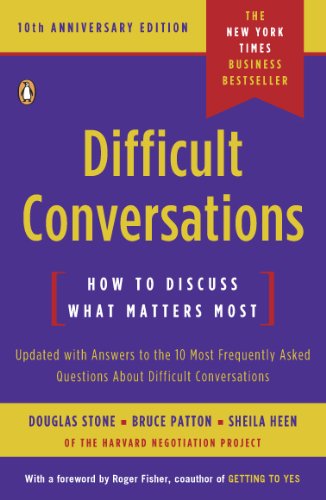
Difficult Conversations: How to Discuss What Matters Most

Taking responsibility for your contribution up front prevents the other person from using it as a shield to avoid a discussion of their own contribution.
Sheila Heen • Difficult Conversations: How to Discuss What Matters Most
Focusing on the contributions of both the boss and the assistant – seeking understanding rather than judgment – is critical. This is not just good practice, it accords more closely with reality. As a rule, when things go wrong in human relationships, everyone has contributed in some important way.
Sheila Heen • Difficult Conversations: How to Discuss What Matters Most
It means letting the other person know that what they have said has made an impression on you, that their feelings matter to you, and that you are working to understand them.
Sheila Heen • Difficult Conversations: How to Discuss What Matters Most
When your real goal is finding the dog, fixing the ceiling, and preventing such incidents in the future, focusing on blame is a waste of time. It neither helps you understand the problem looking back, nor helps you fix it going forward.
Sheila Heen • Difficult Conversations: How to Discuss What Matters Most
Of course, in advance, we don’t know what we don’t know. But rather than assuming we already know everything we need to, we should assume that there is important information we don’t have access to. It’s a good bet to be true.
Sheila Heen • Difficult Conversations: How to Discuss What Matters Most
Use questions when you want to learn and statements when you have something to convey. Ultimately it is the combination of assertiveness and inquiry that helps us pool our insights, learn things we didn’t know, and lay the foundation for creative and effective problem solving.
Sheila Heen • Difficult Conversations: How to Discuss What Matters Most
Talking successfully about feelings requires you to be scrupulous about taking the judgments, attributions, and statements of blame out of what you are saying, and putting the statement of feeling in.
Sheila Heen • Difficult Conversations: How to Discuss What Matters Most
The Third Story would remove the judgment from the description, and instead describe the problem as a difference
Sheila Heen • Difficult Conversations: How to Discuss What Matters Most
A significant pattern we’ve observed in our coaching involves the sometimes elusive relationship between the two skills. When people are having a hard time listening, often it is not because they don’t know how to listen well. It is, paradoxically, because they don’t know how to express themselves well. Unexpressed feelings can block the ability to
... See more